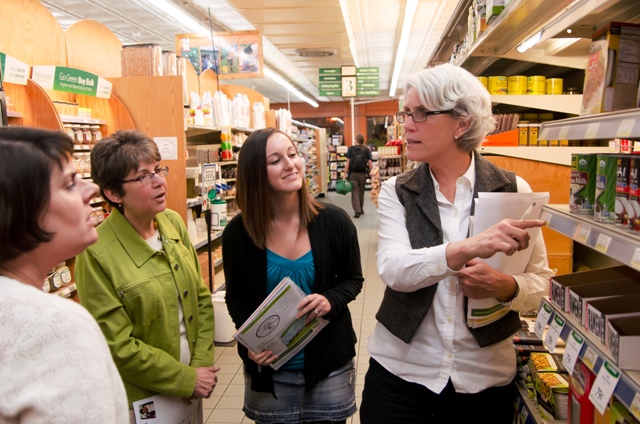
“My dad died of cancer and two of my friends were diagnosed on that same day,” said Roanoke resident Jeanie Redick at the Roanoke Natural Food Co-op’s Shopping Healthy on a Budget class on Tuesday.
One friend switched to a healthier lifestyle and ate raw and organic foods to combat the cancer. That friend spent her last two years of life attending her children’s sports events. Redick’s other friend chose the traditional route and spent her last two years on a hospital bed, undergoing chemo treatments.
“I had a health challenge of my own in ‘87,” Redick went on. “I had a tumor and my six week old had some health problems… I couldn’t have cancer. I had four kids. I wanted to see them grow up. Though it was benign, I knew it was time to get serious.”
Redick got serious about her organic home garden and more intentional about not eating the foods she knew were bad for her. She became a certified holistic nutritionist and integrative health coach and in 1999 founded Eat for Life, her own private business practice in Roanoke where she provides health coaching, seminars and classes. Additionally, she is an owner and former employee of the Co-op where she also teaches.
However, Redick acknowledges that eating healthy can be expensive. A bag of processed, manufactured potato chips loaded with fat and artificial ingredients at 99 cents is much cheaper to buy than one organic yellow bell pepper which cost three times as much.
The term ‘malnutrition’ may evoke images of bone-thin children in developing countries, but the US is also battling an epidemic of malnutrition. Here, it looks less like starvation and more like diabetes, obesity and cancer. Many health experts link these diseases to the food we eat, its artificiality and lack of nutrition.
“What you eat affects which diseases you may develop,” said Dean Ornish, a clinical professor of medicine at the University of California, San Francisco, and founder of the Preventive Medicine Research Institute, in the New York Times.
He continued, “About 75 percent of the $2.8 trillion in annual health care costs in the United States is from chronic diseases that can often be reversed or prevented altogether by a healthy lifestyle.”
Many in the Co-op community call the standard American diet the ‘S.A.D.’ diet. “We’re the ones that are malnourished,” said Redick. “It really is S.A.D.”
Locally grown apples might cost more than a box of microwave popcorn, so many Americans, concerned about their wallets, choose the cheaper item. So how do we tackle malnutrition without going broke? There were several useful suggestions at Tuesday’s class.
First, Redick said that there are so many things on sale at any given time, there’s no reason to buy something full price. She is also an avid coupon user, noting that her daughter saved on half of a large grocery purchase at the Co-op just by using coupons. Co-op owners also receive noteworthy savings.
Second, a deep freeze could be a good long term investment to be able to stock up on sale items or to buy in bulk. The Co-op gives 10% off a bulk purchase because they are saved from the trouble of stocking, shelving and recycling the box. “They pass that savings to you,” she said.
Third, buy produce that’s in season, especially at your nearest farmer’s market. It’s a lot cheaper when it’s in season.
Fourth, prioritize what you buy organic. Foods with skins that you peel off and don’t eat, like avocados and onions, will be less important to buy organic. However, foods with porous skins or skins you eat, like berries, lettuce and bell peppers, should be bought organic so as to avoid consuming toxic pesticides.
Lastly, Redick emphasized eating meat and dairy organically. Toxins are more concentrated in the fats animals produce, so naturally milk products have very high concentrations of hormones or other toxins if not organic.
Women, especially, should be careful. “You see growing rates of breast cancer because breast tissue has a lot of fat, so the toxins a woman has in her body all collect there,” said master herbalist and Roanoke resident Linda Bennett who also attended the class.
– Keisha Graziadei-Shup

